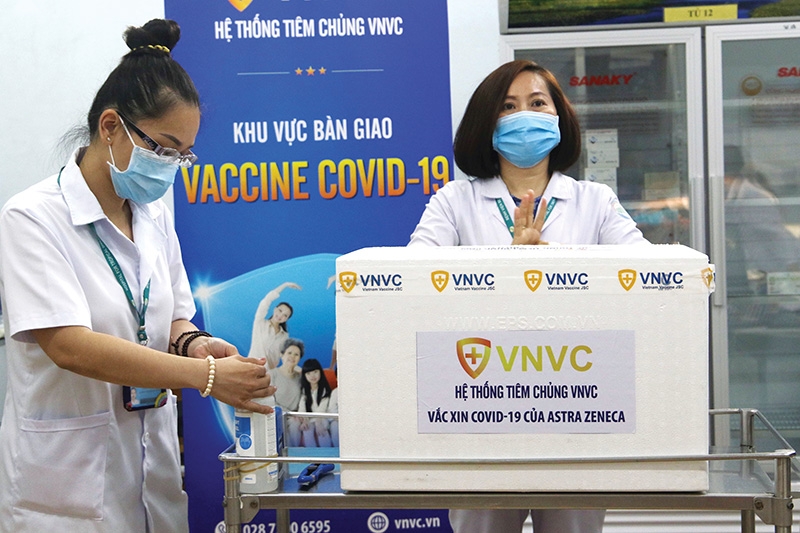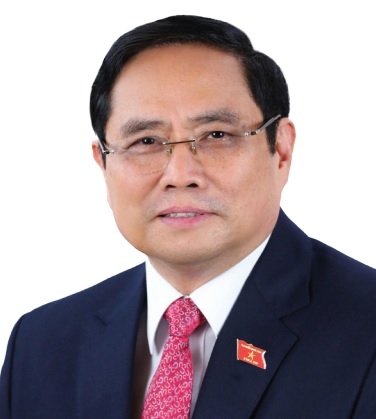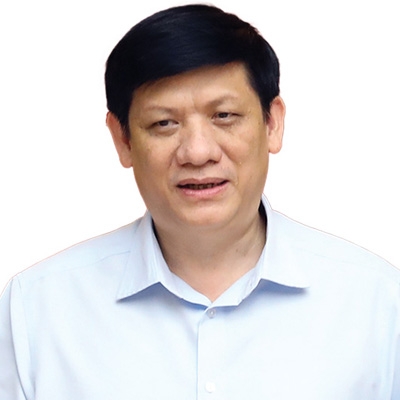Country prepares for efficient jab rollout
 |
| VNVC was the first company in Vietnam to build super-cold storage for incoming COVID-19 vaccines. Photo: Le Toan |
A source from the Ministry of Health (MoH) told VIR that some multinational corporations (MNCs) have sent documents to the ministry, proposing to provide cold chain, transportation, and distribution services for COVID-19 vaccines.
To prepare for the nationwide COVID-19 vaccination campaign, Vietnam has so far focused on the development of cold storage, thus prompting an opportunity to provide an extensive network of shipping, storage, communication, and healthcare services to achieve the last mile of the journey.
As the largest vaccine and cold chain pharmaceutical distributor in Asia (excluding China and Japan), Zuellig Pharma in late 2020 announced that it will significantly expand its cold storage warehouse capacity in key regional markets over the next 12 months. The move comes as the company prepares for the anticipated storage and distribution demands of vaccines during the pandemic.
Similarly, as one of Asia’s biggest vaccine distributors, DKSH’s mission is to help Asian patients and citizens. The company has cold chain capabilities, distribution competence, and service comprehensiveness.
However, the potential for MNCs to join the vaccination effort remains uncertain. Thus far, the country still uses Vietnamese-run storage, but there could be demand in the near future for a change.
Duong Thi Hong, deputy head of the National Institute of Hygiene and Epidemiology, asserted that the country ensures shipping, storage, and freezing capacities for the vaccination drive. Moreover, the country is completing cold storage systems with support of the military to meet the demand.
Last week, the Military Zone 9 completed cold storage for COVID-19 vaccine preservation, serving the Mekong Delta as part of the nationwide campaign.
At Military Zone 4, investment in upgrading cold storage facilities for vaccine preservation is also being completed. The storage covers 216 square metres, and is planned to store four million doses of vaccines when operational. According to the MoH, the participation of the military in this endeavour is a new method.
Vietnam’s vaccines will be stored in the military zones, jointly managed by the Ministry of Defense and the MoH, meeting GSP standards.
At present, some cold storage systems are ready for use. The MoH certified three deep cold storages at -86 degrees Celsius, and 51 cold storages at 2-8 degrees, together with specialised transportation facilities and devices to store about 170 million doses of vaccines.
Three super-cold storage systems separated in 30 cabinets with capacity of 100,000 doses each from Vietnam Vaccine JSC (VNVC) were certified in January, rendering the company the first unit to have such facilities.
“VNVC made a big investment in its infrastructure and other necessities to preserve a huge number of doses in different preservation conditions. Since mid-2020, in anticipation of the difficulties in vaccine transportation and preservation, VNVC imported much equipment and built a system of super-cold storages,” said Tran Thi Trung Trinh, quality control director at VNVC.
Vietnam has now approved several COVID-19 vaccines for emergency use, including AstraZeneca, Pfizer-BioNTech, Moderna, Sinopharm, and Sputnik V. Most vaccines require storage at 2-8 degrees Celsius, but others like Pfizer-BioNTech and Moderna need to be stored and transported at temperatures lower than minus 80 degrees.
According to the MoH, the scarcity of COVID-19 vaccines remains for now, but Vietnam is projected to receive more vaccines after September as more will be produced, thus easing the shortfall.
There are about 11 vaccines currently approved by the European Drug Administration, the Food and Drug Administration, and emergency licensing countries, with 237 other potential vaccines currently under study.
| Pham Minh Chinh - Prime Minister
Along with Vietnam, the world is facing an unpredictable and serious development of the global health crisis, especially since the occurrence of the Delta variant, with faster and stronger transmissions. Vaccines are the most effective tool to prevent and fight the pandemic. With the vision to put an end to the pandemic, the Party and the state are determined to implement the national vaccine strategy, which focuses on the import of COVID-19 vaccines, technology transfer, and production of locally-made vaccines. The target of the vaccine strategy is to provide free-of-charge vaccination for people annually to increase community immunity, and ensure equal access to vaccines for all. We plan to vaccinate about 75 million people between the second half of 2021 and early 2022. In a bid to realise this strategy, we have been taking a number of solutions like negotiations about vaccine purchase and financial mobilisation. With the country’s strong efforts, partners commit to supply over 100 million doses of COVID-19 vaccines in 2021. Also, the transfer of technology for research and production of vaccines is being strengthened and shows initial positive results. To ensure the efficacy of the vaccination, the Ministry of Health must work with relevant ministries and localities, especially the police and armed forces. When more doses of COVID-19 vaccines arrive in Vietnam, we need to be ready for preservation, transportation, and distribution. Nguyen Thanh Long - Minister of Health
The nationwide COVID-19 vaccination campaign is a historic event. The country has so far organised a number of vaccination programmes, with the latest being the campaign to use 23 million doses of Measles-Rubella vaccine for children. The campaign has some differences with others carried out in the past, including great involvement of military force in development of COVID-19 vaccine cold storages and vaccination; strong application of technology, and establishment of vaccination quality supervision teams among others. This time, the campaign happens on a larger scale, covering 150 million doses of vaccines over nine months towards April 2022, aiming to increase community immunity. The aim is to vaccinate 70 per cent of the population aged 18 and above. We signed contracts to buy vaccines last November, and even have commitments and agreements reached back in September. The scarcity will continue until this September. Afterwards, more doses of vaccines will arrive in Vietnam, thus increasing the coverage. Alain Cany - Chairman European Chamber of Commerce in Vietnam
EuroCham welcomes the roll-out of Vietnam’s mass vaccination campaign. There is no route out of this pandemic without an ambitious and accelerated vaccination drive; beginning with front-line health workers and those essential to business operations before reaching out to the rest of the population. This is the key to unlocking current restrictions on trade, travel, and tourism. Vietnam has made impressive progress in procuring supplies with several millions more doses set to arrive imminently. The challenge now is to ensure an efficient and effective roll out of this program. Speed is of the essence here – the sooner vaccines can be administered, the sooner we can return to normal life. Of course, the government will take the lead. However, the private sector could play a huge supporting role. European companies have experience in developing and distributing vaccines to large populations at scale and pace. And some of our members – like FV Hospital, for example – can also provide the cold storage required to keep the vaccines at the correct temperature. |
What the stars mean:
★ Poor ★ ★ Promising ★★★ Good ★★★★ Very good ★★★★★ Exceptional
Themes: Healthcare Platform
- Hanoi intensifies airport monitoring amid Nipah disease risks
- Cosmetics rules set for overhaul under draft decree
- Policy obstacles being addressed in drug licensing and renewal
- Sanofi, Long Chau Pharmacy relaunch medicine blister pack collection initiative
- Takeda Vietnam awarded for ongoing support of Vietnam’s sustainability efforts
Related Contents
Latest News
More News
- Foreign leaders extend congratulations to Party General Secretary To Lam (January 25, 2026 | 10:01)
- 14th National Party Congress wraps up with success (January 25, 2026 | 09:49)
- Congratulations from VFF Central Committee's int’l partners to 14th National Party Congress (January 25, 2026 | 09:46)
- 14th Party Central Committee unanimously elects To Lam as General Secretary (January 23, 2026 | 16:22)
- Worldwide congratulations underscore confidence in Vietnam’s 14th Party Congress (January 23, 2026 | 09:02)
- Political parties, organisations, int’l friends send congratulations to 14th National Party Congress (January 22, 2026 | 09:33)
- Press release on second working day of 14th National Party Congress (January 22, 2026 | 09:19)
- 14th National Party Congress: Japanese media highlight Vietnam’s growth targets (January 21, 2026 | 09:46)
- 14th National Party Congress: Driving force for Vietnam to continue renewal, innovation, breakthroughs (January 21, 2026 | 09:42)
- Vietnam remains spiritual support for progressive forces: Colombian party leader (January 21, 2026 | 08:00)




 Tag:
Tag:


















 Mobile Version
Mobile Version